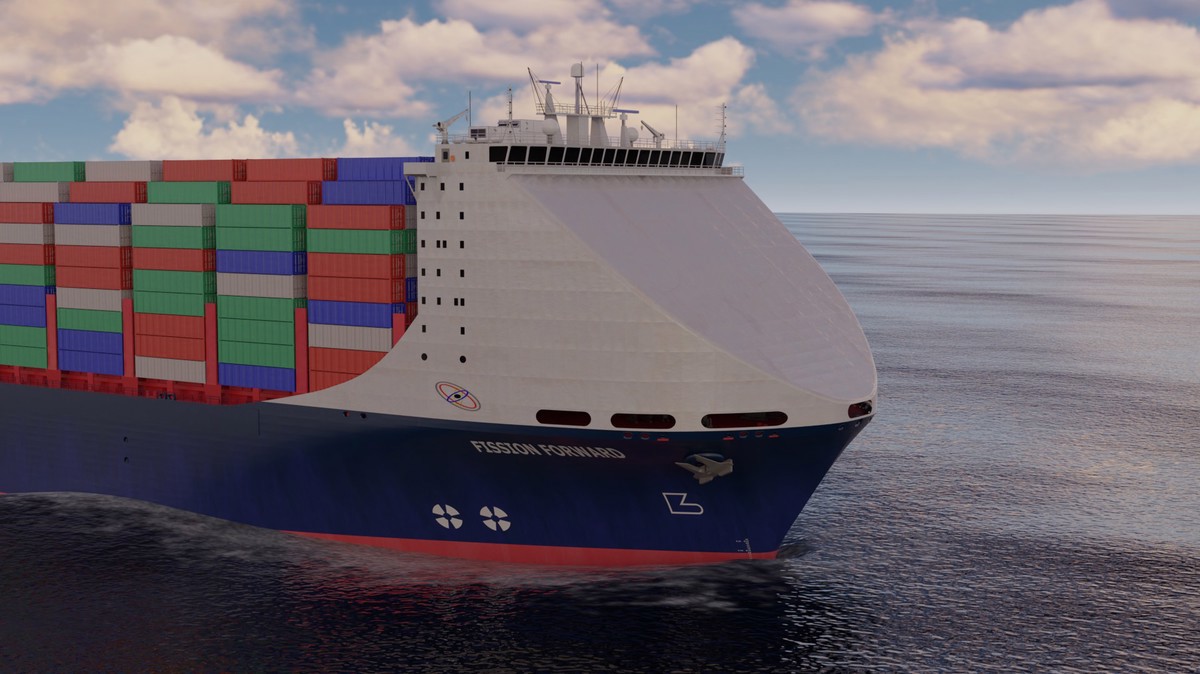Shipping is getting ready to adopt nuclear power - LR
As more new nuclear technologies are being considered and developed for maritime use, the shipping industry is becoming more prepared to adopt nuclear technology, a report from Lloyd's Register (LR) found.
 PHOTO: Concept model of a nuclear-powered container ship. ABS
PHOTO: Concept model of a nuclear-powered container ship. ABS
Reflecting the growing focus on the maritime industry, the LR report evaluated five categories of nuclear technology, up from three in 2023. This year's assessment included high-temperature gas reactors and liquid metal-cooled reactors, along with pressurized water reactors (PWRs), micro-reactors (heat pipes), and molten salt reactors.
The latest assessment was carried out by the Lloyd’s Register Maritime Decarbonisation Hub (LR MDH), a collaborative initiative between Lloyd’s Register and the Lloyd’s Register Foundation focused on advancing and assessing zero-carbon fuel technologies and solutions for the maritime industry.
Current trends in nuclear technology for shipping
The industry's desire to cut carbon emissions and concerns about the availability and cost of alternative marine fuels have led to a growing interest in nuclear power adoption in commercial shipping, the report highlighted. Increased funding for cutting-edge technologies, such as low-pressure passive systems, has resulted from this interest.
Regulatory frameworks for offshore and maritime nuclear technologies are also under development, identifying new applications given the diverse bunkering requirements compared to traditional marine fuels.
The introduction of new nuclear technologies enhances the inherent safety of onboard ship energy systems, addressing public safety concerns. Additionally, technologies that recycle “spent fuel” from PWRs reduce the environmental impact of fuel disposal.
Spent fuel refers to the used nuclear fuel that has been irradiated inside a nuclear reactor and can no longer be used for a chain reaction for energy production. It is highly radioactive and requires careful handling.
In November 2023, the practicality of offshore refuelling was demonstrated with the first refuelling of a floating nuclear power station at the Akademik Lomonosov platform in Russia.
Several collaborative efforts across different sectors are exploring the potential of compact nuclear reactors for powering commercial vessels.
For instance, nuclear technology firm NewCleo is partnering with shipbuilder Fincantieri and classification society RINA for the development of commercial nuclear propulsion. Ship designer Herbert Engineering has joined forces with classification society ABS. In another initiative, nine South Korean container liners and research institutions are collaborating on a separate project.
The Danish startup Seaborg Technologies has been exploring maritime applications of small molten salt reactors.
Stigmas remain but there is hope
Despite technological strides, public perception continues to impact community readiness for nuclear industry advancements due to safety concerns, while uncertainties about broader adoption hinder investments in commercial shipping.
LR believes that as more evidence from operational trials becomes available, uncertainties in operation, costs, and safety aspects are expected to decrease. Initiatives to develop regulations for offshore nuclear technology adoption are underway, bolstering investment and community readiness.
The focus is on promoting community acceptance through education and evidence from real-world demonstrations. Additionally, it is crucial to define port infrastructure requirements, such as adapting facilities for refuelling and managing spent fuel, which necessitates collaboration among technology providers, regulators, and ports.
“It is now essential for the nuclear and maritime industries to collaborate in addressing issues that impact community and investment readiness, including regulatory uncertainties and overall negative public perception of security risk and safety of nuclear deployment in commercial shipping,” LR MDH’s decarbonisation innovation manager Amelia Hipwell says.
By Tuhin Roy
Please get in touch with comments or additional information to news@engine.online






